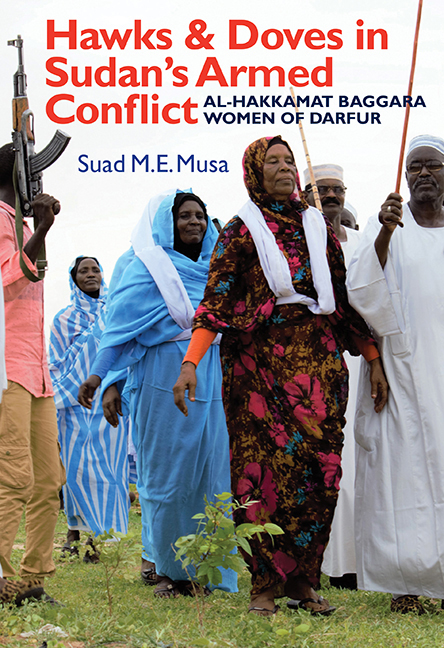Book contents
- Frontmatter
- Dedication
- Contents
- List of Illustrations
- Acknowledgements
- Glossary
- Abbreviations
- Note on Transliteration
- Introduction: Conflict in Darfur and the Role of Rural Darfuri Women
- 1 Ethnicity and Administration in Darfur
- 2 Conflict in Darfur: Causes and Implications
- 3 Al-Hakkamat Women
- 4 Local Inter-ethnic Conflicts
- 5 Government and Racial Assimilation of Ethnic Groups
- 6 Liaising with Government
- 7 New Duties and Obligations
- 8 Roles in Peace and Reconciliation
- 9 Urban Identity and Social Change
- 10 Conclusion
- Appendix: Darfur Chronology, 1445–2017
- Bibliography
- Index
- Eastern African Studies
2 - Conflict in Darfur: Causes and Implications
Published online by Cambridge University Press: 12 October 2019
- Frontmatter
- Dedication
- Contents
- List of Illustrations
- Acknowledgements
- Glossary
- Abbreviations
- Note on Transliteration
- Introduction: Conflict in Darfur and the Role of Rural Darfuri Women
- 1 Ethnicity and Administration in Darfur
- 2 Conflict in Darfur: Causes and Implications
- 3 Al-Hakkamat Women
- 4 Local Inter-ethnic Conflicts
- 5 Government and Racial Assimilation of Ethnic Groups
- 6 Liaising with Government
- 7 New Duties and Obligations
- 8 Roles in Peace and Reconciliation
- 9 Urban Identity and Social Change
- 10 Conclusion
- Appendix: Darfur Chronology, 1445–2017
- Bibliography
- Index
- Eastern African Studies
Summary
Violent conflict in Darfur is not a new or a sudden phenomenon; tribes of the same or different ethnic groups have engaged in sporadic disputes and deadly clashes in the past. Since the 1970s, however, these clashes have become more recurrent and have often involved groups of pastoralists of the Baggara and Abbala Arab tribes. The situation has further been compounded by the emergence of politically motivated Darfuri-armed movements and insurgencies since 1991/2. Many causes could be cited for the eruption of these conflicts and their escalation into fatal violence beyond the local capacity to resolve them, as discussed below.
A HISTORY OF CONFLICT IN DARFUR
During the Fur sultanate (1445–1916), most of the conflicts between Darfuri tribes were disputes either over the use of common resources or over authority and administration. The former often ensued from pastoralists breaching local conventions on common resource management and causing damage to farmers’ crops by allowing their herds to encroach into the farms of sedentary communities, whereas the second usually erupted when the authority of tribes over their Dars was challenged or threatened.
Tribal authorities were often able to resolve the disputes over resources through their own local resolution mechanisms, which people usually respected and abided by. But sometimes a group would attempt to grab the lands of other tribespeople by force and use it for their own settlement. Since the reign of Sultan Tayrab (1768–87), the Fur sultans intervened to force the invaders off the lands they had seized and to maintain law and order. For instance, Sultan Abd al-Rahman (1787–1801) intervened, with a force of sixty horsemen, to terminate the conflict between the Mahriyah and the Mahamid Abbala Arabs, confiscating half of their camels in retribution. The pattern of conflicts caused by the encroachment of pastoralists’ herds on the farms, and the subsequent interventions of the sultans to restore law and order, continued up until the era of Ali Dinar (1898– 1916), who forced large groups of pastoral communities to leave the lands they seized from sedentary communities during the Turco-Egyptian rule (1874–81) (O'fahey and Spaulding, 1974).
- Type
- Chapter
- Information
- Hawks and Doves in Sudan's Armed ConflictAl-Hakkamat Baggara Women of Darfur, pp. 30 - 45Publisher: Boydell & BrewerPrint publication year: 2018



